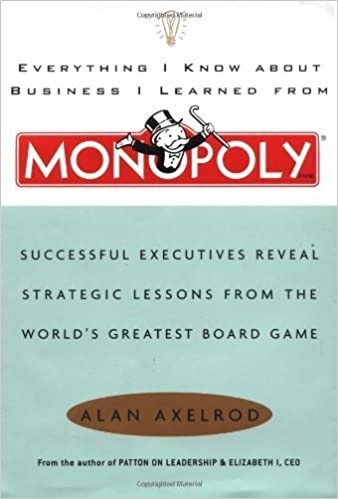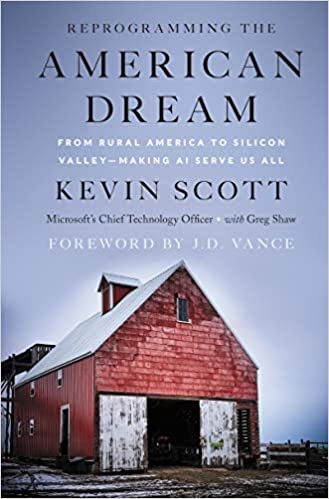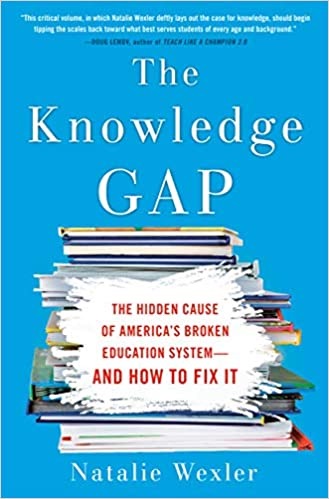
Everything I Know About Business I Learned From MONOPOLY: Successful Executives Reveal Strategic Lessons From the World’s Greatest Board Game by Alan Axelrod is a handbook on how to use the world’s most popular board game to think about, explore, and rethink the nature of business and the doing of business. It offers insight and provocation, which is a good starting place. If you are finding more time for board games, be sure to dust of your MONOPOLY board after you read this book.
Introduction
- Parker Brothers introduced MONOPOLY in 1935 and within one year it became the best seller in the US. This was in the heart of the great depression when business wasn’t working too well. Then a game that modeled capitalism struck a chord. It allowed people to experience success and failure in their own living rooms. The game is just complicated enough to be realistic and fun. It was developed from business school simulations for the general public by Charles Darrow who was turned down the first time it offered it to Parker Bros. He kept selling it himself and Parker Brothers got wind of his success. Ask any business person what got them interested in business and they are likely to say MONOPOLY. Like the rest of the book, this chapter contains quotes from famous business people.
Part I: There Are Rules – 1.The Object of the Game
- The objective of MONOPOLY is to become the wealthiest player through buying, renting, and selling property. You need to be aggressive when it comes to acquiring property. Being cautious might keep you in the game longer before you go bankrupt. Caution is not a winning strategy.
2. All Things Being Equal
- Unlike the real world, each MONOPOLY player starts with the same amount of money ($1,500) at the same place. Beyond that things are unequal based on each player’s abilities. In real life, there are great disparities regarding where we start. A combination of innate ability, ambition, parental wealth and parenting skills, and luck determine where we end up. Like the real world, luck is also a factor in MONOPOLY via the roll of the dice and the luck of the draw (Community Chest and Chance cards).
3. A Roll of the Dice
- Luck implies some controlling power. Chance implies randomness. Confident people anticipate success. If you feel like a winner, you will behave like a winner, you will make moves that winners make, you will, therefore, improve your luck. It’s your attitude and self-confidence that will predispose you to make your own luck. Our lives are full of familiar events mingled with a few surprises. In MONOPOLY there is a lot of familiar territory accompanied by chance. You can’t control the dice, but it’s good to know the odds. Out of 36 possible combinations. Six give you a seven. Five give a six or an eight. Four give you a five or a nine. Three give you a four or a ten. Two give you a three or an eleven, and only one gives you a two or a twelve.
4. Passing GO
- Passing Go and collecting $200 is like working and collecting a salary. Ideally, you make enough to meet your needs and maybe enough to save some. In MONOPOLY you can’t live on your salary alone and you have to put the money you take in at risk. Unless you pull the go-to jail card, collecting your GO salary should be part of your strategy.
5. The Rule of Opportunity
- The big idea here is unless you have a positive, purposeful, affirmative reason to say NO, say Yes to every opportunity that presents itself. In MONOPOLY you need a very good reason not to buy an unowned property you land on. The rules state that if you don’t choose to purchase an unowned property you land on, the Banker is supposed to sell it at auction. Many people don’t follow this rule, but you should as it makes the game much more dynamic.
6. Facing Reality and Paying Your Debts
- The key point is not to learn to avoid risk but to accept risk as necessary to success. Having accepted the necessity of risk the object becomes making a choice of what risks to take and how far to take them. Accepting a risk should not require abandoning fiscal responsibility. Putting all your chips on a single number is a risk, but not a wisely calculated risk. Stretching intelligently but aggressively to the edge of your means is often necessary to win. Aggressive but intelligent risk is part of living, working, doing business, and making deals. In a sense, MONOPOLY is a kind of financial flight simulator that lets you try out the lessons of value, responsibility, and prudence.
7. Mortgaging the Future
- Your only credit option in MONOPOLY is to mortgage properties you own. Doing so you collect half their listed value from the Bank and can no longer collect rent. Ideally, you would mortgage single properties to develop a monopoly you own. Unlike real mortgages, there are no regular payments and you can un-mortgage a property any time by paying back the loan with 10% interest. Don’t do this until you have at least three houses on all of your monopolies. Mortgage single properties first followed by utilities and railroads as the latter command higher rent.
8 Vigilance
- The key rule here is “The owner may not collect the rent if he/she fails to ask for it before the second player following throws the dice.” You have no obligation to remind someone that you have just landed on their property and you shouldn’t. Part of the success in this game is being vigilant throughout. This includes keeping track of who owns what as property deeds need to be clearly displayed in front of each player. Being vigilant for other players doesn’t help them learn vigilance.
9. The Random Walk
- Moves around the MONOPOLY board may seem random, but they are not. Thanks to the probability of rolling different die combinations the moves are just complex. You can consult The MONOPOLY Companion by Philip Orbanes for details. Here you will find a list of the chance of landing on each type of property each trip around the board, and there is a surprising range. The fact that Jail is the most common starting place for a move is part of the reason. The key idea is that knowledge itself is useless unless it is applied.









